Description
Protein Kinase CK2 Cellular Function in Normal and Disease States, 2015
Advances in Biochemistry in Health and Disease Series, Vol. 12
Coordinators: Ahmed Khalil, Issinger Olaf-Georg, Szyszka Ryszard
Language: English
Subjects for Protein Kinase CK2 Cellular Function in Normal and...:
Publication date: 10-2016
Support: Print on demand
Publication date: 03-2015
378 p. · 15.5x23.5 cm · Hardback
Description
/li>Contents
/li>Biography
/li>Comment
/li>
Dr. Khalil Ahmed is a Professor at the University of Minnesota, and a Senior Research Career Scientist at Minneapolis VA Health Care System, Minneapolis, Minnesota, U.S.A. He has a long history of studies on the functional biology of protein kinase CK2 in normal and neoplastic cells. He originally described the signal mediated dynamic shuttling of CK2 in the cell, and discovered the role of CK2 as a suppressor of apoptosis. His current research is focused on the mechanism of CK2 regulation of cell death. He is also studying the development of molecular therapeutic strategies using a nanomedicine approach for treatment of prostate and other cancers.
Dr. Olaf-Georg Issinger is a Professor at the University of Southern Denmark, Odense, Denmark. He has been involved in the initial cloning and characterization of protein kinase CK2, a prerequisite for the elucidation of its structure in the absence and presence of specific interaction molecules. His current research focuses on the exploration of cellular signaling pathways in cell lines with respect to the role of various protein kinases using newly characterized kinase inhibitors identified by screening small chemical compound libraries.
Dr. Ryszard Szyszka is a Professor at the John Paul II Catholic University of Lublin, Poland. He is head of the Department of Molecular Biology and Dean of the Faculty of Biotechnology and Environmental Sciences. His research is focused on the identification and characterization of new substrates of protein kinase CK2 from Saccharomyces cerevisiae. Further areas of interest include the structure and regulation of yeast CK2, and discovery of novel CK2 inhibitors.
CK2 is a potential target of drug development for improved cancer therapy
State-of-the-art information on the critical role of CK2 in cellular function and cancer biology?
Crucial tool for post-graduate students and investigators in the field of cancer biology
These books may interest you

Protein Kinase CK2 220.80 €



